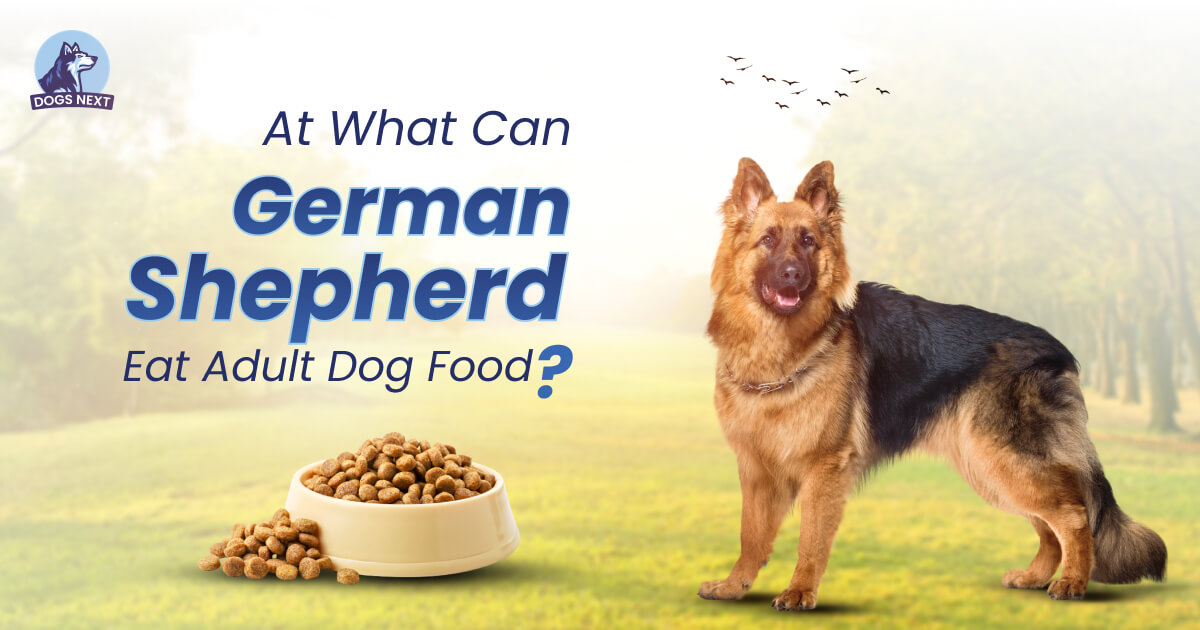German Shepherds can start eating adult dog food around 12 to 18 months old. Consult your vet to confirm the right time.
German Shepherds are known for their intelligence, strength, and loyalty. Proper nutrition is crucial for their overall health and development. Puppies require a diet specifically formulated to support their rapid growth and high energy needs. Transitioning to adult dog food is a significant milestone.
Feeding them the right diet helps maintain their muscle mass, support joint health, and provide essential nutrients.
Nutritional Needs Of German Shepherds
German Shepherds are known for their intelligence, loyalty, and strength. To maintain their health, it’s vital to understand their nutritional needs. Knowing when to switch them to adult dog food is crucial. This ensures they get the right nutrients as they grow.
German Shepherds require a balanced diet to stay healthy. Their nutritional needs change as they grow from puppies to adults. Understanding these needs helps in choosing the right food.
Protein Requirements
German Shepherds need high-quality protein. This helps in muscle development and energy. Adult German Shepherds should get about 18-22% protein in their diet. Good sources include chicken, beef, and fish.
Fat Content
Fats are essential for energy and a shiny coat. Adult German Shepherds should have 5-8% fat in their diet. Healthy fat sources include fish oil, chicken fat, and flaxseed.
Carbohydrates
Carbohydrates provide energy and aid digestion. Look for complex carbs like brown rice, sweet potatoes, and oats. These provide sustained energy and are easy to digest.
Vitamins And Minerals
Vitamins and minerals are essential for overall health. Ensure the food contains vitamins A, B, C, D, E, and K. Important minerals include calcium, phosphorus, and potassium. These support bone health, immune function, and muscle activity.
Caloric Intake
Caloric intake depends on the dog’s age, weight, and activity level. Adult German Shepherds usually need around 1,500-2,000 calories per day. Monitor their weight and adjust food portions accordingly.
| Nutrient | Requirement | Sources |
|---|---|---|
| Protein | 18-22% | Chicken, Beef, Fish |
| Fat | 5-8% | Fish Oil, Chicken Fat, Flaxseed |
| Carbohydrates | Moderate | Brown Rice, Sweet Potatoes, Oats |
| Vitamins | Various | Fruits, Vegetables, Supplements |
| Minerals | Various | Bone Meal, Vegetables, Supplements |
Puppy Vs. Adult Dog Food
German Shepherds are known for their intelligence and loyalty. As these puppies grow, their nutritional needs change. When do German Shepherds transition from puppy food to adult dog food? Understanding the differences between puppy and adult dog food helps ensure they get the right nutrients at the right time.
Nutritional Differences
Puppy food and adult dog food have different nutritional profiles. Puppies need more protein and fat for growth and development. Here are some key differences:
- Protein: Puppies need around 22-32% protein, while adults need 18-25%.
- Fat: Puppies require 10-25% fat. Adult dogs need 8-18%.
- Calories: Puppies need more calories to fuel growth.
- Calcium: Essential for bone development in puppies.
- Vitamins and Minerals: Puppies require more for development.
Here’s a table summarizing these differences:
| Nutrient | Puppy Food | Adult Dog Food |
|---|---|---|
| Protein | 22-32% | 18-25% |
| Fat | 10-25% | 8-18% |
| Calories | Higher | Lower |
| Calcium | Higher | Lower |
| Vitamins and Minerals | Higher | Lower |
Growth Requirements
German Shepherd puppies grow quickly. They need specific nutrients for healthy development. Feeding them the right food supports:
- Bone and Joint Health: Proper calcium and phosphorus levels prevent joint issues.
- Muscle Development: High protein content helps muscle growth.
- Energy Needs: Puppies are active and need more calories.
The growth stages of German Shepherds:
- 0-6 Months: Rapid growth phase; high protein and fat needed.
- 6-12 Months: Steady growth; balanced nutrients required.
- 12+ Months: Transition to adult food; adjust nutrient intake.
Monitoring your puppy’s growth helps ensure they are developing properly. Regular vet check-ups are essential.
Importance Of Proper Nutrition
Proper nutrition is vital for a German Shepherd’s health. It affects:
- Immune System: Nutrient-rich food boosts immunity.
- Skin and Coat Health: Omega fatty acids keep the coat shiny.
- Digestive Health: Quality ingredients prevent digestive issues.
- Long-Term Health: Balanced diet reduces risk of chronic diseases.
Feeding your German Shepherd the right food at each stage of life ensures they grow strong and healthy. Quality dog food brands offer formulas tailored to each life stage. Always consult your vet for personalized advice.
What Age Can German Shepherds Switch to Adult Food
German Shepherds are known for their intelligence, loyalty, and strength. Feeding them the right food at the right age is crucial for their health. Understanding the appropriate time to switch to adult dog food can ensure they grow into healthy and happy adults.
German Shepherds grow rapidly in their first year. Puppy food provides the nutrients they need for this growth. But when should they switch to adult food?
Most German Shepherds are ready for adult food at around 12 to 15 months. Look for signs like:
- Steady growth rate
- Decrease in energy levels
- Weight stabilization
Differences Between Puppy And Adult Food
Puppy food is rich in calories and nutrients to support growth. Adult food has balanced nutrients for maintenance. Here’s a quick comparison:
| Nutrient | Puppy Food | Adult Food |
|---|---|---|
| Calories | Higher | Moderate |
| Protein | High | Balanced |
| Fats | High | Moderate |
Consulting Your Vet
Veterinarians can provide tailored advice. They consider your dog’s health, weight, and activity level. Always consult your vet before making dietary changes.
Switching should be gradual. Mix puppy and adult food over a week:
- Day 1-2: 75% puppy, 25% adult
- Day 3-4: 50% puppy, 50% adult
- Day 5-6: 25% puppy, 75% adult
- Day 7: 100% adult
Signs Your Shepherd Is Ready For Adult Food
German Shepherds are known for their intelligence, strength, and loyalty. As they grow, their nutritional needs change. Knowing when to switch your German Shepherd to adult dog food is crucial. Paying attention to certain signs can help ensure a smooth transition and maintain their health.
Physical Growth
A key indicator that your Shepherd is ready for adult food is their physical growth. German Shepherds typically reach their full height between 12 to 18 months. If your dog has stopped growing taller, it might be time to switch.
Weight Stabilization
Once your German Shepherd’s weight stabilizes, it means they have reached maturity. Adult dog food helps maintain their weight without the extra calories needed for growth. Monitor their weight regularly to ensure they are not gaining or losing too much.
Energy Levels
Adult German Shepherds usually have different energy levels compared to puppies. Reduced hyperactivity can indicate they are transitioning from the puppy phase. Adult dog food is formulated to meet the nutritional needs of less active dogs.
Dental Development
Check your Shepherd’s teeth. Adult teeth are a sign they are growing up. Puppy food is softer and easier to chew, while adult food promotes dental health through proper chewing.
Veterinarian Recommendations
Consulting with your vet is essential. They can provide insights based on your Shepherd’s overall health and development. Vets often recommend switching to adult food around 12 to 18 months.
Behavioral Changes
Notice any behavioral changes. Adult German Shepherds are often calmer and more settled. This shift in behavior can indicate they are ready for adult dog food.
Feeding Schedule
Adult dogs typically eat fewer meals a day. Adjusting the feeding schedule to match their maturity is important. Transitioning to adult food usually aligns with fewer, more substantial meals.
| Sign | Indicator |
|---|---|
| Physical Growth | Height Stabilizes |
| Weight Stabilization | Consistent Weight |
| Energy Levels | Reduced Hyperactivity |
| Dental Development | Adult Teeth |
| Veterinarian Recommendations | Health Check |
| Behavioral Changes | Calmer Behavior |
| Feeding Schedule | Fewer Meals |
Paying attention to these signs ensures your German Shepherd gets the proper nutrition they need as they grow. Transitioning to adult food at the right time supports their overall health and well-being.
Transitioning To Adult Food
German Shepherds are known for their loyalty, intelligence, and energy. Feeding them the right food at the right time is crucial for their health. As they grow, their dietary needs change. Transitioning to adult food is an important step in their development. Understanding when and how to make this change ensures your German Shepherd gets the nutrition they need.
When To Transition To Adult Dog Food
German Shepherd puppies grow rapidly in their first year. They need a diet rich in proteins and calories to support this growth. Typically, German Shepherds can start eating adult dog food between 12 to 18 months of age. This age range is a general guideline and can vary based on individual growth rates and health conditions.
Here are some signs that indicate your German Shepherd is ready for adult food:
- Decreased growth rate: Puppies grow quickly, but this growth slows down as they approach adulthood.
- Behavioral changes: Adult dogs tend to be less hyperactive than puppies.
- Weight stability: When your German Shepherd’s weight stabilizes, it’s a sign they are no longer in the rapid growth phase.
If you’re unsure whether your dog is ready for adult food, consult your veterinarian. They can provide specific recommendations based on your dog’s health and growth patterns.
How To Transition To Adult Dog Food
Transitioning your German Shepherd to adult food should be done gradually to avoid digestive issues. A sudden change in diet can cause stomach upset, diarrhea, or refusal to eat. Follow these steps to ensure a smooth transition:
- Mix the foods: Start by mixing a small amount of adult food with your dog’s current puppy food. Gradually increase the ratio of adult food over a period of 7-10 days.
- Monitor your dog: Watch for any signs of digestive discomfort, such as loose stools or vomiting. If you notice any issues, slow down the transition process.
- Maintain a feeding schedule: Consistency is key. Feed your dog at the same times each day to help them adjust to the new food.
| Days | Puppy Food | Adult Food |
|---|---|---|
| 1-3 | 75% | 25% |
| 4-6 | 50% | 50% |
| 7-10 | 25%</td | 75% |
| 11+ | 0% | 100% |
Remember, every dog is unique. Adjust the transition plan based on your dog’s needs. Consult your vet if you have any concerns during this process.
What To Avoid
Introduction paragraph about At What Can German Shepherds Eat Adult Dog Food? and What to Avoid
Feeding your German Shepherd the right food is crucial for their health. Knowing when to switch to adult dog food helps in their growth and development. But it’s equally important to know what to avoid. This ensures your furry friend gets the best nutrition without any harmful effects.
Avoid Human Food
Human food can be toxic to dogs. Avoid giving your German Shepherd chocolate, grapes, and onions. These foods can cause severe health problems.
Avoid Too Much Protein
While protein is essential, too much can harm your German Shepherd. Look for balanced dog food. Too much protein can lead to kidney issues.
Avoid Fillers
Some dog foods contain fillers like corn and soy. These ingredients offer little nutritional value. Choose dog food with high-quality ingredients.
Avoid Artificial Additives
Artificial colors and preservatives can harm your dog. Opt for natural dog food. Avoid products with long ingredient lists of chemicals.
Avoid High-fat Foods
High-fat foods can lead to obesity. This can cause joint problems in German Shepherds. Ensure the dog food is low in fat.
Avoid Excessive Treats
Treats should be given in moderation. Too many treats can disrupt a balanced diet. Stick to healthy treats.
| What to Avoid | Reason |
|---|---|
| Human Food | Can be toxic |
| Too Much Protein | Leads to kidney issues |
| Fillers | Low nutritional value |
| Artificial Additives | Harmful chemicals |
| High-Fat Foods | Causes obesity |
| Excessive Treats | Disrupts balanced diet |
Choosing The Right Adult Dog Food
German Shepherds are known for their intelligence and loyalty. As they grow, their dietary needs change. Knowing when to switch to adult dog food is crucial for their health. This guide helps you choose the right adult dog food for your German Shepherd, ensuring they get the nutrients needed for a healthy life.
Understanding Nutritional Needs
German Shepherds require a diet rich in protein, fats, and essential vitamins. High-quality protein supports muscle health. Healthy fats provide energy. Essential vitamins and minerals maintain overall well-being.
Ingredients To Look For
- High-quality protein: Chicken, beef, or fish.
- Healthy fats: Fish oil or flaxseed oil.
- Whole grains: Brown rice or oats.
- Vegetables: Carrots, peas, or spinach.
- Essential vitamins and minerals: Calcium, phosphorus, and omega-3 fatty acids.
Ingredients To Avoid
- Artificial preservatives: BHA, BHT, or ethoxyquin.
- Fillers: Corn, soy, or wheat.
- Artificial colors and flavors.
Portion Control
Adult German Shepherds need balanced portion sizes. Overfeeding can lead to obesity. Underfeeding can cause nutritional deficiencies. Consult your vet for the ideal portion size based on your dog’s age, weight, and activity level.
Feeding Schedule
Establish a consistent feeding schedule to maintain a healthy digestive system. Feed your German Shepherd twice daily. This helps regulate their metabolism and keeps them active.
Monitoring Your Dog’s Health
Watch for signs of allergies or digestive issues when switching foods. Common signs include itching, vomiting, or diarrhea. If these occur, consult your vet immediately.
Recommended Brands
| Brand | Special Features |
|---|---|
| Royal Canin | Formulated for German Shepherds, supports joint health. |
| Blue Buffalo | Natural ingredients, no artificial additives. |
| Hill’s Science Diet | Balanced nutrition, supports digestion. |
| Wellness CORE | Grain-free, high-protein formula. |
Professional Advice
Introduction paragraph about At What Can German Shepherds Eat Adult Dog Food? and Professional Advice…
German Shepherds are a popular breed known for their intelligence and strength. Feeding them the right food is crucial for their health. Many dog owners wonder when their German Shepherd can start eating adult dog food. Seeking professional advice can clear up any confusion. Below, we outline expert recommendations to help you make the best decision for your furry friend.
Veterinarians and pet nutritionists often recommend switching to adult dog food when your German Shepherd reaches a specific age and weight. This ensures they get the nutrients they need for optimal growth and health.
Consult Your Veterinarian
Always consult your veterinarian before making any changes to your dog’s diet. They can provide personalized advice based on your dog’s health, age, and activity level. Most experts suggest transitioning to adult food between 12 and 18 months of age.
Monitor Your Dog’s Growth
Keep an eye on your German Shepherd’s growth and development. Rapid growth may indicate the need for a diet change. Adult food supports muscle development and maintains a healthy weight.
Choose The Right Food
Not all dog foods are created equal. Look for high-quality, protein-rich foods designed for large breeds. This ensures your German Shepherd gets the right nutrients without unnecessary fillers.
When transitioning to adult food, do it gradually. Mix the new food with the puppy food over a week to avoid digestive issues. Start with a 25% adult food and 75% puppy food mix, then slowly increase the adult food portion.
| Age | Food Type |
|---|---|
| 0-12 months | Puppy Food |
| 12-18 months | Transition Phase |
| 18 months+ | Adult Dog Food |
Signs Your Dog Is Ready
Watch for signs that indicate your dog is ready for adult food. These include reaching 80% of their expected adult weight, reduced growth rate, and increased activity levels. Consult your vet to confirm.
By following professional advice and monitoring your dog’s development, you can ensure they transition to adult dog food at the right time. Proper nutrition is key to a happy and healthy German Shepherd.
Frequently Asked Questions
When Can German Shepherds Eat Adult Dog Food?
German Shepherds can start eating adult dog food around 12 months old. Consult your vet for personalized advice.
Is Adult Dog Food Good For German Shepherds?
Yes, adult dog food provides balanced nutrition. Ensure it meets the specific needs of German Shepherds.
What Ingredients Should German Shepherd Dog Food Have?
German Shepherd dog food should include high-quality protein, healthy fats, and essential vitamins. Avoid fillers and artificial additives.
How Do I Transition My German Shepherd To Adult Dog Food?
Gradually mix adult dog food with puppy food over a week. Increase the adult food portion daily.
Conclusion
Switching your German Shepherd to adult dog food is a crucial step. Ensure the food meets their nutritional needs. Consult your vet for personalized advice. Proper nutrition will keep your German Shepherd healthy and energetic. Make the transition smooth by gradually mixing new food with their current diet.




